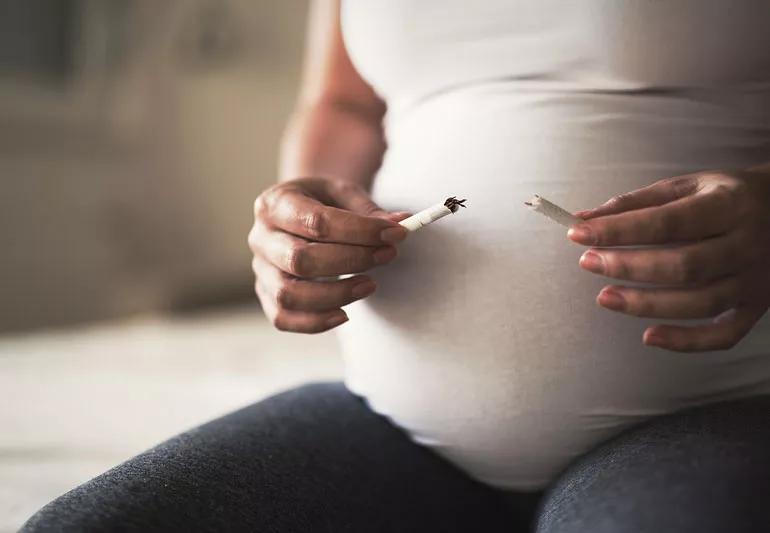Just a single cigarette a day can have serious health consequences

If you’re pregnant and thinking of smoking a cigarette, consider this: You may be making a life-or-death decision for your baby.
Advertisement
Cleveland Clinic is a non-profit academic medical center. Advertising on our site helps support our mission. We do not endorse non-Cleveland Clinic products or services. Policy
Any smoking during pregnancy — even just a single cigarette a day — increases the risk of a miscarriage, stillbirth or sudden unexpected infant death (SUID).
Let’s be blunt: It’s NOT safe to smoke during pregnancy or around a newborn. For more on the toxic health effects of cigarettes during this stage of life, we turn to Ob/Gyn Rebecca Starck, MD.
Lighting up a cigarette unlocks and releases more than 7,000 chemicals, including some that are toxic. The list includes chemicals found in rat poison, nail polish remover, embalming fluid and insecticides.
The poisons you inhale from a cigarette are carried through your bloodstream and to your growing fetus. Smoking while pregnant may:
Advertisement
Again, all of the above are in addition to the heightened risk of a miscarriage, stillbirth or SUID. Research shows that 22% of SUIDs in the United States may be attributed to smoking during pregnancy.
“And the more cigarettes you smoke per day, the greater your baby’s chances of developing these and other health problems,” says Dr. Starck. “There is no ‘safe’ level of smoking for your baby’s health.”
Despite the known risks, nearly 1 in 5 who are pregnant smoke cigarettes, according to the U.S. Centers for Disease Control and Prevention (CDC). Thankfully, that number has been in decline.
The smoke that burns off the end of your lit cigarette contains more harmful substances — nicotine, tar, carbon monoxide and more nasty stuff — than the smoke that you’re actually inhaling.
A baby breathing in this toxic secondhand smoke could begin to develop reduced lung capacity, notes Dr. Starck. They’re also at a higher risk of sudden infant death syndrome (SIDS).
Long term, children of smokers have an increased risk of lung cancer, heart disease, emphysema, allergies, asthma and other health problems. They’re also more apt to have learning and behavioral problems.
More immediately, a baby around cigarette smoke may experience:
Cigarette smoke remains a hazard long after it dissipates. “Thirdhand smoke” is the name given to the residue from that puffed-out contaminated air. It sticks to furniture, carpeting, walls, clothes … even dust.
This leftover smoke scum contains more than 250 chemicals, according to the American Academy of Pediatrics.
Young children are particularly vulnerable to thirdhand smoke as they scoot, crawl and roll around on floors, warns Dr. Starck. They can also be exposed just by being picked up and held by someone with smoke residue on their clothes or skin.
Don’t be fooled by the sweet smells created by e-cigarettes and vaping: That aerosol mist is loaded with nicotine and other substances that could be a health threat during pregnancy and after birth.
The nicotine in e-cigarettes can damage a developing baby’s brain and lungs, according to the CDC. Research is ongoing given the relative newness of e-cigarettes, but preliminary findings suggest a negative health impact similar to traditional cigarettes.
If you’ve read this far, odds are you understand how important it is to quit smoking during pregnancy and after giving birth. Your health and your child’s health will benefit from breaking the habit.
Advertisement
It’s best to act early — ideally before you get pregnant. That sort of timing would allow you to use nicotine replacement therapy (NRT) methods such as nicotine patches and nicotine gum without worry, states Dr. Starck.
As mentioned earlier, nicotine is quite toxic and potentially harmful to your fetus. That’s why NRT products are not ideal during pregnancy.
(At times, NRT may be used during pregnancy under the close supervision of a healthcare provider if other cessation methods have not worked. Talk to your doctor to find the best approach for you.)
So, what if you find out you’re pregnant and you still smoke regularly? Is it too late to stop?
“There’s a health benefit that comes whenever you quit,” emphasizes Dr. Starck. “Every day after you stop smoking makes a difference. Every cigarette you don’t smoke matters.”
Your body begins to see benefits within 20 minutes of snuffing out your last cigarette. If you’re pregnant, the heart rate of your fetus should quickly return to normal. The odds of your baby having breathing problems decline, too.
Will quitting be easy? Absolutely not. Nicotine is an addictive substance, so withdrawal symptoms are common. You might get headaches, grow irritated and feel fatigued.
Advertisement
But that difficult time will pass. Resources to stay motivated and find support include:
“Think about your reasons for quitting and what it means for your child,” encourages Dr. Starck. “You can do this.”
Advertisement
Learn more about our editorial process.
Advertisement

Most rashes aren’t dangerous — but it’s worth talking to your pregnancy provider about them

The best available evidence indicates that, used correctly, acetaminophen is safe to take throughout a pregnancy

Prenatal massage, done properly, is a safe and effective way to lower stress and relieve pregnancy discomforts

Avoid high-mercury fish and processed meat, and go easy on salt and caffeine

Unless your healthcare provider tells you otherwise, it’s typically considered safe to have sex during pregnancy

Hot tubs and saunas raise your body temperature and can pose risks

Baths can be safe if you turn down the temp, avoid irritating bath products and take extra precautions against

SSRIs are the safest antidepressants to take in pregnancy — and pose less risk than unmanaged depression

Wearing a scarf, adjusting your outdoor activities and following your asthma treatment plan can help limit breathing problems

Your diet in the weeks, days and hours ahead of your race can power you to the finish line

When someone guilt trips you, they’re using emotionally manipulative behavior to try to get you to act a certain way